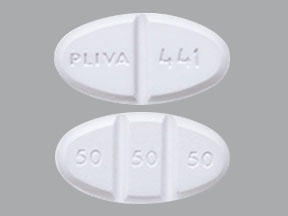Trazodone Hydrochloride is an antidepressant that works by influencing neurotransmitters in the brain, particularly serotonin.
Its mechanism of action is complex and involves several processes that contribute to its therapeutic effects.
Mechanism of Action:
- Serotonin Reuptake Inhibition:
- Trazodone primarily works as a serotonin reuptake inhibitor (SRI). It prevents the reabsorption (reuptake) of serotonin, a neurotransmitter, into neurons, making more serotonin available in the brain. Increased levels of serotonin can help improve mood, reduce anxiety, and alleviate symptoms of depression.
- Serotonin Receptor Antagonism:
- Trazodone also acts as a serotonin receptor antagonist, particularly at the 5-HT2A and 5-HT2C receptors. By blocking these receptors, trazodone helps modulate the activity of serotonin, reducing anxiety and depressive symptoms. This antagonism is also thought to contribute to its sedative effects.
- Histamine and Alpha-1 Adrenergic Receptor Blockade:
- Histamine H1 Receptor Antagonism: Trazodone has strong antihistaminic properties due to its ability to block histamine H1 receptors. This action contributes to its sedative effects, making it effective for treating insomnia.
- Alpha-1 Adrenergic Receptor Antagonism: Trazodone also blocks alpha-1 adrenergic receptors, which can cause vasodilation (widening of blood vessels) and may contribute to some of the drug’s side effects, such as orthostatic hypotension (a sudden drop in blood pressure when standing up).
- Impact on Sleep:
- Due to its combined actions on serotonin, histamine, and adrenergic receptors, trazodone has a notable sedative effect. This makes it effective for improving sleep quality in patients with depression, anxiety, or insomnia.
Summary of Effects:
- Antidepressant Effects: By increasing serotonin levels and modulating serotonin receptor activity, trazodone helps alleviate symptoms of depression.
- Anxiolytic Effects: The drug’s action on serotonin receptors also contributes to its ability to reduce anxiety.
- Sedative Effects: The antihistaminic and alpha-1 adrenergic receptor blockade lead to significant sedative properties, which are beneficial in treating insomnia but can also cause drowsiness as a side effect.
Overall:
Trazodone Hydrochloride is a multi-faceted medication that acts on several neurotransmitter systems in the brain, primarily targeting serotonin to improve mood and reduce anxiety while also exerting sedative effects useful for treating sleep disorders.
Visited 11 times, 1 visit(s) today
